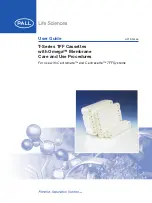
13
INSTALLATION
EN
QUICK SPA
QCC CLG30 RGBW - REV001B
and strengthen the core. Add layers until the hole is the correct diameter.
Alternatively, a hollow or solid cylinder of the correct diameter can be coated with wax and taped in place. Fill the gap
between the cylinder and hull with casting epoxy. After the epoxy has set, remove the cylinder.
6. Sand and clean the area around the hole, inside and outside, to ensure that the sealant will adhere properly to the
hull. If there is any petroleum residue inside the hull, remove it with either mild household detergent or a weak solvent
(alcohol) before sanding.
Example of hole in a fiberglass hull with cofferdam
• Drill a Ø 12 mm hole at the point where you want to fit
the spotlight and prepare the hull according to the type
of material it is made of (for instance, reinforce and seal
the area around the hole if you are dealing with a cored
fibreglass hull).
• Apply a continuous line of a suitable sealant around the
bolt (as shown in the sketch) and seal the points where
the fixing screws are fitted according to the type of hull.
• Pass the cable; then insert the bolt in the hull hole.
Gently turn the light body so as to evenly distribute the
sealant. Remove any excess sealant.
INSTALLATION WITHOUT A THRU-HULL FITTING
INSTALLATION
KEEP THE ADHESIVE
LABEL UPRIGHT
Pay attention to the direction of the product. Take the
adhesive label affixed in the light body as reference.
F
• Fasten the product with screws suitable for the kind of
hull.
• Carefully inspect the installation so as to make sure that
the sealant fully seals the product where needed. If in
doubt, repeat the steps to install the product again.
• Apply a suitable anti-fouling paint coat to the metallic
bezel exposed to water.
HULL HOLE
Ø 12 mm
CABLE
PIN
LIGHT BODY
Ø 22 mm (7/8”)
Ø 12 mm (7/8”)
Ø 52 mm (2” 3/64)
Ø 43 mm (2” 3/64)
HOLE
CASTING EPOXY
WITHOUT THRU-HULL
WITHOUT THRU-HULL
CORE
CORE
CASTING EPOXY
INNER SKIN
OUTER SKIN
Finish the installation by carrying out the electrical connections. Refer to the section “CONNECTION DIAGRAM” on page 16.














































